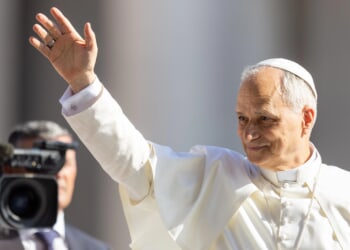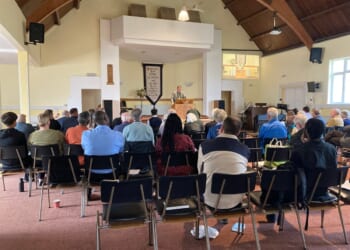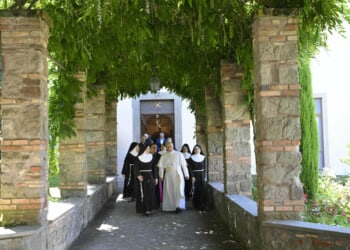Vatican City, Jul 17, 2025 /
15:30 pm
The permanent observer of the Holy See to the United Nations, Archbishop Gabriele Caccia, participated in this week’s ‘High-Level Political Forum’ with two speeches at UN headquarters in New York.
The July 13-15 event focused on the UN’s sustainable development goals, according to Vatican News. In particular, Caccia addressed Goal 3, which seeks to guarantee access to healthcare, and Goal 5, on “gender equality and empowering women.”
The 2030 Agenda for Sustainable Development is an action plan approved by the United Nations General Assembly in 2015. It is structured around 17 Sustainable Development Goals (SDGs) and 169 targets to be achieved within a 15-year period.
Among these goals are “No poverty, zero hunger, good health and well-being, affordable and clean energy, gender equality, and reduced inequalities.” While many of these goals enjoy broad Catholic support, some also engender controversy in aspects which conflict with the doctrine of the Catholic Church.
Access to basic medical care
In his first address, Caccia denounced inequalities in access to medical services and highlighted the need to raise awareness about mental health, the source of many problems that are often hidden.
“These inequalities are evident in the millions of people who still lack access to basic medical care, in the stagnant maternal mortality rates, and in the silent suffering of those suffering from untreated mental illness,” he stated.
He also stressed that health should not be understood solely as “the absence of illness” and reiterated the right to health for all people, proposing the implementation of “integrated policies” that recognize the link between health and other dimensions such as poverty and education.
In this regard, he urged the protection of the most vulnerable, especially children, the elderly, people with disabilities, and victims of war.
The importance of the family
During his second address, the permanent observer of the Holy See to the UN referred to the Dignitas Infinita declaration and recalled that true equality between men and women requires conditions that promote “the integral development of women,” such as healthcare, decent work, and quality education.
Caccia also rejected ideological agendas and denounced that “too often, the development efforts of the international community treat gender equality primarily as a matter of individual autonomy, divorced from relationships and responsibilities.”
He advocated for a change in perspective that values “the complementarity between men and women,” emphasizing the importance of families as a “space for relationships.”
“In tandem with promoting equality between women and men, measures must be taken to support and protect families, motherhood, and fatherhood,” he emphasized.
The Vatican official also denounced the ecological debt that is suffocating a large portion of the least developed African countries; and highlighted that “the persistent and widespread reality of poverty continues to afflict millions of people, denying them material well-being and undermining their God-given dignity, while stifling their integral human development.”
Therefore, he emphasized that poverty must remain “the central and urgent priority of the international community.”
(Story continues below)
Subscribe to our daily newsletter
This story was first published by ACI Prensa, CNA’s Spanish-language news partner. It has been translated and adapted by CNA.


















